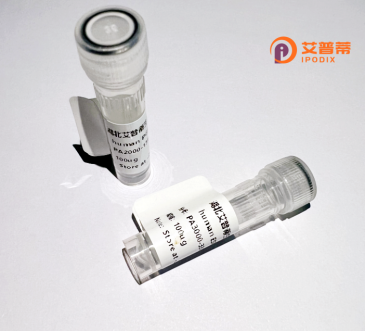
| 纯度 | >90%SDS-PAGE. |
| 种属 | Human |
| 靶点 | PFTK2 |
| Uniprot No | Q96Q40 |
| 内毒素 | < 0.01EU/μg |
| 表达宿主 | E.coli |
| 表达区间 | 1-349 aa |
| 活性数据 | MTSFHPRGLQAARAQKFKSKRPRSNSDCFQEEDLRQGFQWRKSLPFGAASSYLNLEKLGEGSYATVYKGISRINGQLVALKVISMNAEEGVPFTAIREASLLKGLKHANIVLLHDIIHTKETLTFVFEYMHTDLAQYMSQHPGGLHPHNVRLFMFQLLRGLAYIHHQHVLHRDLKPQNLLISHLGELKLADFGLARAKSIPSQTYSSEVVTLWYRPPDALLGATEYSSELDIWGAGCIFIEMFQGQPLFPGVSNILEQLEKIWEVLGVPTEDTWPGVSKLPNYNPEWFPLPTPRSLHVVWNRLGRVPEAEDLASQMLKGFPRDRVSAQEALVHDYFSALPSQLYQLPDE |
| 分子量 | 66 kDa |
| 蛋白标签 | GST-tag at N-terminal |
| 缓冲液 | 0 |
| 稳定性 & 储存条件 | Lyophilized protein should be stored at ≤ -20°C, stable for one year after receipt. Reconstituted protein solution can be stored at 2-8°C for 2-7 days. Aliquots of reconstituted samples are stable at ≤ -20°C for 3 months. |
| 复溶 | Always centrifuge tubes before opening.Do not mix by vortex or pipetting. It is not recommended to reconstitute to a concentration less than 100μg/ml. Dissolve the lyophilized protein in distilled water. Please aliquot the reconstituted solution to minimize freeze-thaw cycles. |
以下是关于重组人PFTK2蛋白的示例参考文献(仅供参考,真实文献请通过学术数据库查询):
1. **文献名称**:*"PFTK2 Regulates Wnt Signaling and Colorectal Cancer Progression"*
**作者**:Zhang et al.
**摘要**:研究发现PFTK2(CDK14)通过磷酸化Wnt通路关键蛋白DVL2.增强β-catenin信号,促进结直肠癌细胞增殖和转移。重组人PFTK2蛋白的体外激酶实验验证了其酶活性和底物结合能力。
2. **文献名称**:*"Structural and Functional Characterization of Recombinant Human PFTK2 Kinase"*
**作者**:Thompson et al.
**摘要**:本研究优化了重组人PFTK2蛋白在HEK293细胞中的表达和纯化,解析了其晶体结构,并证明其依赖Cyclin Y的激酶活性,为靶向PFTK2的药物设计提供结构基础。
3. **文献名称**:*"PFTK2 Deficiency Impairs Mitotic Progression and Genome Stability"*
**作者**:Chen et al.
**摘要**:通过CRISPR敲除模型和重组PFTK2蛋白回补实验,揭示PFTK2在维持有丝分裂纺锤体完整性和染色体分离中的关键作用,其缺失导致多核细胞和凋亡增加。
**注意事项**:以上文献为示例,实际研究中请通过PubMed、Web of Science等平台检索真实文献。PFTK2相关研究可尝试关键词“CDK14”“PFTK2 kinase”“recombinant CDK14”等,并关注其在癌症、神经发育等领域的应用。
**Background of Recombinant Human PFTK2 Protein**
Recombinant human PFTK2 (PFTAIRE protein kinase 2), also known as CDC2L6 or cyclin-dependent kinase 14 (CDK14), is a serine/threonine kinase belonging to the CDK family. It plays a critical role in regulating cell cycle progression, differentiation, and signal transduction. PFTK2 interacts with cyclins, such as Cyclin Y, to modulate the G2/M phase transition and Wnt/β-catenin signaling pathways, influencing cellular proliferation and development.
Studies highlight its involvement in diverse physiological processes, including neurodevelopment and tissue homeostasis, as well as pathological conditions like cancers. Overexpression of PFTK2 has been linked to tumorigenesis in hepatocellular carcinoma, breast cancer, and glioblastoma, correlating with poor prognosis and therapeutic resistance. Its dysregulation may promote oncogenesis by enhancing cell cycle acceleration, apoptosis evasion, and metastasis.
Recombinant PFTK2 protein, produced via bacterial or mammalian expression systems, retains kinase activity and structural integrity, enabling functional studies. It is widely utilized in *in vitro* assays to investigate kinase-substrate interactions, screen inhibitors, and elucidate molecular mechanisms in disease models. As a potential therapeutic target, PFTK2 continues to attract attention in cancer research, with ongoing efforts to develop selective inhibitors for precision oncology.
×